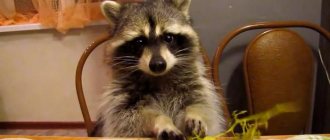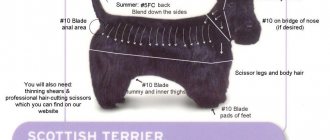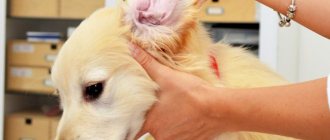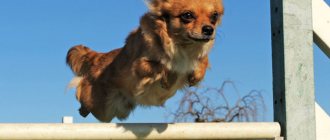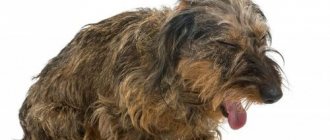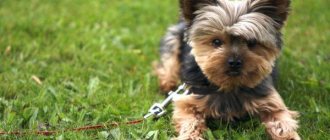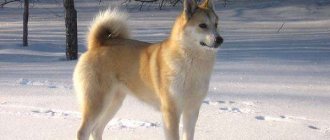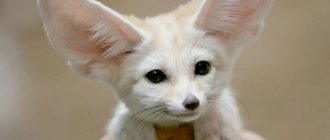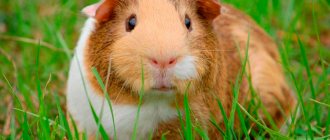All dog lovers and dog handlers know the African non-barking dog Basenji. This is a unique breed that came to the countries of the former USSR from distant Africa. The animals are compact in size and make excellent companions for their owners. They are easy to care for, but require strict training. Before purchasing, you should read the description of the Congo Terrier and its features.
Uniqueness: why the Basenji is “silent”
There are many legends why Basenji dogs do not bark. One of them says that the dog simply does not want to give away the owner’s secrets, and therefore does not “talk.” Bush dogs make unusual sounds that are difficult to describe in words. They growl, squeal, and express their emotions by snorting and howling. Animals only vocalize on special occasions, when they feel joy, excitement, resentment, or have been left alone. There are many legends regarding the reasons for the breed's silence, but there are no clear facts yet.
History of the origin of the breed
The breed originated in South Africa, more than 8,000 years ago. In the early 20th century, Basenjis were popular in North America and Europe. Representatives of the breed are still kept in the royal houses of European countries. On the territory of Russia, Congo terriers appeared in the late 1990s. They charmed dog lovers with their friendly appearance and lack of barking, and their rare, melodious purring. Thanks to this feature, even those who cannot tolerate dog barking can have animals. The breed arose and developed without outside help; no selection was carried out.
Curious facts
There is a belief that the ancient Basenji breed was used in hunting as round-up dogs; they hunted small livestock, game, and small antelopes. Animals could frighten them and drive them under hunting spears. To avoid being defeated by larger predators, the dogs began to remain silent. In modern Zaire, Congo terriers are hunted differently. The breed is no longer hunted, African silent ones have turned into assistants to solitary hunters. Dogs are valued more than wives, because in a poor country, the availability of food in the house depends on the Basenji.
The pharaohs of Ancient Egypt honored dogs of the ancient African breed; they were considered a talisman. They gave pets to each other and literally adored them. Evidence of this is provided by images inside the pharaoh's tombs. They were buried with all the regalia along with their beloved dogs.
African silent ones wash themselves in the same way as cats, using their paws. This habit touches the owners. The breed is extremely clean, does not tolerate dirt, and therefore washes itself.
Pros and cons of the Basenji breed
The Basenji dog breed has many advantages, but there are also disadvantages. Awareness of the nuances will help you make your choice.
| pros | Minuses |
| Fast learner | Demanding food |
| No smell | High need for attention |
| Cleanliness | Waywardness |
| No barking | Natural cunning |
| Good attitude towards children | |
| Positivity, activity |
Breed varieties
There are 2 varieties of the Basenji breed: forest and plain. The first ones grow up to 40 centimeters tall; they are also called the pygmy dog, mini terrier. The eye shade and color are darker than those of the second subspecies. Plains dogs have a white collar that extends over part of the chest, like “pants.” Their height at the withers is up to 40 cm, their legs are high, their color is light brown and white. The plain species is larger than the forest species.
Care and maintenance
The Basenji breed needs proper care and supervision.
Recommendations:
- daily combing out dry dead epithelium with a hard glove;
- Basenjis should be bathed no more often than once every six months and only with shampoo for sensitive dog skin. Otherwise, the pet may get dermatitis;
- you should purchase overalls for walking in rainy or snowy weather;
- The dog's eyes and ears must be wiped and cleaned with a cotton pad. File the claws of a pet with a nail file;
- to avoid ticks or fleas on Basenjis, you need to treat the fur with special products or purchase a collar;
- dogs love warmth very much, so if their owners do not want to sleep in the same bed with the dog, it is worth purchasing a small soft house or bed for them.
Expert opinion
Anna Abramenko
An avid dog lover. Experience in veterinary medicine since 2009.
Ask a Question
Silent dogs require daily walks in any weather for at least 1.5-2 hours. Otherwise, your pets will have health problems.
Characteristics of the Basenji breed
Four-legged friends are quite energetic and active. They have an independent character, dogs often do not listen to their owners, they require constant employment. If you leave a Congo Terrier alone for a long time, you can expect unpleasant surprises from him. The dog will not tolerate an insult, but will ruin something in the house in retaliation.
Intelligence
Basenji dogs are famous for their sharp minds and easily learn new commands. Because of their curiosity, they are quick and capable of getting into unpleasant situations. Due to their developed intelligence, dogs sometimes “take revenge” on their owners for inappropriate treatment.
Activity
It is important for Basenji owners to take into account that the dog is very active and requires long walks and release of physical energy. In the race for prey, he can get so carried away that he begins to ignore commands. This is due to its strong hunting qualities.
Advice! Without long walks, the dog becomes lethargic and may get sick.
Attitude towards others
Pets have a strong attachment to their owners. They choose one owner, and perceive the rest of the family as a pack. Animals are suspicious of others if they sense danger from them. When the owner gets along well with strangers, the Congo Terrier will not show aggression.
Attitude towards children
Dogs with an energetic character will be good friends for school-age children, but you shouldn’t leave them with kids. The terrier will not want to become a living toy and may respond with aggression to children's games. If the family already has small children, you should take a puppy-age dog. Then she will get used to them and will not perceive them as a potential danger. Leaving pets and children unattended is prohibited. Children should not be allowed to distract the terrier while he is eating. African silent ones do not get along well with cats and other small animals unless they have been raised with them from a young age.
Security and guard qualities
Basenji dogs are known as excellent guard dogs, but they are not kept in enclosures. Pets will be sensitive to the safety of the apartment from thieves, despite the inability to bark. The four-legged defenders will make characteristic sounds when they sense danger. The animal's watchdog qualities are at the highest level, but you should not keep it on a chain in a private house.
Basenji
The Basenji is a unique dog. She cannot bark, so she is well suited for those who do not like overly sociable pets. However, this breed has another problem: the owners claim that Basenjis are more cat-like in character than dogs. They are independent and almost never become attached to their owner. This is a wayward breed. Basenjis can be touchy and vindictive. Despite the lack of barking, this is still not the quietest companion, because they can howl and whine, and in addition they are also very active.
This breed is perfect for keeping in a city apartment.
Size and appearance
Males grow up to 43 centimeters in height, the dog's weight is approximately 10-12 kilograms. The height of the female is 38-41 cm, weight is 9-11 kilograms. There are 3 types of color considered standard:
- red and white;
- tricolor;
- brindle color.
In the latter version, a red tint prevails, with black stripes appearing. The tricolor is a black shade with reddish-red tan, spots on the cheekbones, muzzle, and under the organs of vision. The Basenji's ears are large, erect, and turned up. The end of the tail, sternum and “slippers” are always white, depending on the type of color.
South African Boerboel: breed description, standards
The South African Boerboel, whose photo shows a strong dog, does not convey beauty, lightness and grace. Outwardly heavy, she easily runs and jumps, able to climb a high ladder or jump over a wide ditch.
The breed standards are:
- height at the withers up to 70 cm (male), 65 (female), weight 80-90 kg;
Attention! A deviation is considered to be a height of a male below 60 cm, a female -55.
- the head is rectangular, wide, short;
- there are strong muscles on the cheekbones, but the cheekbones practically do not protrude;
- the furrow between the eyes is poorly marked;
- eyes are round, set wide apart;
Attention! According to standards, all shades of brown are allowed in eye color, the darkest shade being the best.
- jaws slightly narrow in front, strong;
- scissor bite, strong, white teeth, regular alignment;
- the upper lip, hanging over the lower one, covers it and the teeth;
- nostrils widely spaced;
- the ears are located close to the head, set wide and high, wider at the base, the ends are rounded;
- the neck is strong, muscular, of medium thickness, the scruff clearly stands out;
- the body is rectangular, muscular, the back is slightly convex; the sternum reaches the level of the elbow;
- the sacrum is wide, muscular, height at the level of the withers;
- the tail is thick, set high;
Attention! Usually the tail of Boerboels is docked at the level of 3-4 vertebrae, or undocked, the length of which reaches the hock joint. The defect of the rock is a looped tail.
- the paws are strong, muscular, the front paws have oblique blades, pronounced angles, the hind paws are somewhat smaller than the front paws;
- the skin is mobile, does not fit tightly, is thick:
- let's say a dewlap in the neck and above the eyebrows;
- the coat is short, but quite thick and smooth;
- color red, fawn, brindle (stripes are vertical, asymmetrical, dark);
Attention! Boerboels have pronounced pigmentation: the rim of the eyes, nose, lips, palate, paw pads, genital area, claws are exclusively black.
The character and behavior of the Boerboel are discussed. The main role is security and protection, so the animal must be non-aggressive and obedient.
Basenji care and dog maintenance
Caring for a Basenji dog is not difficult, it is important to follow these rules:
- walk your pet regularly;
- carry out hygiene procedures;
- provide balanced nutrition;
- educate, train;
- promptly treat emerging diseases.
With proper care, the pet will live up to 16 years. You can keep the African silent bird in a private house or apartment. In the first case, there must be a high gate. Dogs will not take root well in a hostel or communal apartment.
Hygiene and bathing
Basenji dogs do not like water; they are washed when the need arises. Usually bathe your pet 3 times a month. It is necessary to use a special shampoo so as not to harm sensitive skin. After washing, dry the wool with a soft terry towel. It is not advisable to use a hair dryer.
In addition to bathing, the dog must be brushed once a week with a soft brush. Since the coat is short, the procedure is easy. Dead cells and hairs are removed, the fur becomes smooth and shiny.
Walks
Four-legged friends are able to escape from their owner if there is no control. This happens when a pet sees “prey” and decides to chase it. This could be chasing a cat or yard dogs. It is prohibited to let an animal off a leash. You can't let your dog go out in nature. Constant training, active games, and encouragement with treats will help keep her close. A terrier should not be bored with its owner.
Important! You need to walk your pet often, 2 times a day for 1.5-2 hours. If the African silent bird lives in a private house where there is a high fence, it can be let out for an independent walk.
In apartments, you should keep your four-legged friend in a comfortable bed that is suitable in size. A set of toys is required. Sometimes some need to be removed so that the dog does not lose interest in them. Then, take them out and change them one by one. For the first time, it is worth buying a cat litter box or disposable diapers. When the pet gets used to its new place of residence, it will begin to go to the toilet as expected.
Nutrition Basenji
You can feed the animal raw, lean meat. Bones are given up to 2 times a day. Permitted products include:
- fish;
- offal;
- buckwheat, rice
Adding salt to food is prohibited. Give your pet a hard-boiled egg once a week. Among porridges, you can give preference to buckwheat, rice, wheat cereal in water without seasoning, add a piece of butter to them. Animals can be switched to dry food. You can't feed them to prevent obesity.
The bowl must be clean. Clean terriers will not eat from dirty dishes.
African Ridgeback: how to care
These dogs require minimal grooming. Due to their short, dense coat without undercoat, they are odorless. You can bathe them once every 2 months or when they get dirty. It is enough to simply comb the fur with a special brush or mitten 1-2 times a month. The Ridgeback is easy to bathe and dries quickly. Therefore, in the summer you can allow your dog to swim in safe bodies of water.
In addition to caring for the coat, you need to pay attention to caring for your pet’s teeth, claws and ears. You need to trim your nails regularly, inspect and clean your ears, and brush your teeth every week. In cold weather, it is better to wear insulated overalls on your pet, since Ridgebacks do not have a warm undercoat.
In addition, when keeping a dog at home, it is very important to maintain its physical shape. To do this, you need to walk your pet every day, allowing him to run for at least 30 minutes. It is advisable to regularly take your dog out into nature, where it can frolic in the wild. Ridgebacks can run for a long time, so the owner can go on joint marathons or bike rides with the pet.
Education and training
Basenji dogs quickly learn new commands, especially with frequent praise from the owner. It is important to teach your pet to respond to its name, and not to pick up something from the ground. Conduct training in a quiet space where there are no cars.
You should learn one command at a time. It is forbidden to shout at the animal, kick it, or hit it. Give commands in a calm but loud tone, without aggressive notes. If the dog doesn't listen, lightly flick it on the nose. To establish a good relationship, act on the principle of carrots and sticks. For a well-done exercise, reward the dog with a treat. The first commands that should be taught are “Come to me!”, “Near!”. It is important that the African Terrier does not fall or hit anything, especially in the kidney area. This is the Basenji's weak point.
Health and treatment
The Basenji breed has good immunity and excellent health. But due to the characteristics of the species, dogs are prone to the following diseases:
- hip dysplasia;
- umbilical hernia;
- autoimmune anemia;
- thyroid dysfunction;
- problems with the gastrointestinal tract;
- retinal atrophy and other eye diseases;
- Fanconi syndrome (kidney pathology).
?
Fanconi syndrome is considered rare, but for some reason it is the Egyptian Basenji breed that is most susceptible to it. Since 1976, geneticists have been trying to identify the causes of this disease, but so far to no avail. Unfortunately, no animal is immune from it, so it is strongly recommended to have your dog examined every 6 months. The first bad signs are uncontrollable thirst and drinking, weight loss, rapid dehydration, and frequent urination.
Health and characteristic diseases
Congo Terriers have strong health and rarely get sick. Still, there is a tendency to certain pathologies, but with proper care, the dog will be healthy. Frequent diseases in Basenji include Fanconi syndrome and a number of other ailments:
- eye diseases;
- hypothyroidism;
- hemolytic anemia;
- coloboma;
- hip dysplasia;
- umbilical hernia.
If you notice the disease in time and take your dog to the veterinarian, it can be easily cured.
Breeding
Before breeding dogs, you should make sure that they do not have diseases, especially those transmitted hereditarily. Only purebred individuals need to be born. If the selection of a partner takes place on the Internet, you should look at the pet’s pedigree and documents.
Mating
The first heat in female dogs occurs at 1.5 years of age. You need to prepare for breeding by providing adequate nutrition and vitamins, and carrying out treatment for worms. Estrus occurs once a year, and not 2, like other dogs. Copulation must take place in the male dog's territory.
Pregnancy
The initial phase of the perinatal period is difficult to determine in a dog. She becomes lethargic and constantly sleepy. The belly is visible only after the 6th week, pregnancy lasts 63 days. During this period, the color of the nipples changes, and the animal may experience the urge to vomit. At the end of gestation, the puppies can be seen moving with the naked eye. From 2 months of age, vaccinate babies according to their personal vaccination calendar. It is better to use imported products.
Activation of puppies is also required. The procedure is a pet breeding control survey. The head of the breed visits the owner’s home or nursery, assesses the condition of the whelped bitch, and examines the offspring. Next, they create a general card for all the cubs, and an individual card for each one. It describes their appearance, the condition of their fur, teeth, and bite.
Childbirth
A Basenji female gives birth to about 4-5 puppies. Dog children of different colors. If we are talking about the first birth, it is better to call a veterinarian at home. In severe cases, dogs undergo caesarean section. After the puppies are born, it is important to provide the bitch with decent nutrition and provide foods rich in vitamins. When the cubs are 21 days old, they are treated for ticks.
Ridgeback Health
Dogs of this breed have strong immunity. They are usually healthy, but in modern urban conditions, even such hardy animals can get sick. Ridgebacks sometimes have hip dysplasia or spinal osteochondrosis and cataracts. They are often prone to obesity and allergic reactions. Therefore, it is very important to feed your pet properly, regularly take it to the veterinarian for examinations, and vaccinate on time. Then the African Ridgeback will delight its owner for a long time with its intelligence, cheerful and active disposition.
Author: Oskina Oksana Valentinovna
Source: fb.ru
photograph
How to choose a Basenji puppy
The cost of Basenji puppies ranges from 20 to 50 thousand rubles, depending on the method of purchase. You can buy a dog for 15,000 rubles, but there is a high risk of being scammed. You should study the breed standard in advance to buy a real African Silent Terrier.
There are several breed classes, from which the price for a specific dog is set.
- Show class. These are puppies born from titled parents with good pedigree, documents and fully complying with the breed standard. Such cubs are bought for exhibitions and participation in competitions. They do not have hereditary diseases, therefore, show-class dogs are the most expensive of all purchasing options. These puppies are taken from trusted nurseries from experienced breeders. The cost of dogs is 40,000 rubles, depending on the pedigree.
- Breeding class. These are completely healthy dogs, with a good pedigree, but according to certain criteria they do not reach the show category. In the future they can produce healthy offspring. With proper mating, puppies are able to enter the show class. The cost varies between 30-40 thousand rubles.
- Pet class. These are pets that, by standards, do not fit into the previous categories and do not have the right to take part in competitions. Deviations from the standard can be due to hereditarily transmitted pathologies, for example, dwarfism or fur color. Sometimes bitches that are not capable of producing offspring are classified as the Pet class. They will never win at shows, but will become a devoted friend to the owner. This option is the most budget-friendly; you can buy a Pet-class puppy for 30,000 rubles from a breeder.
The cost of Basenji may be lower for breeders who do not pay attention to the tendency to hereditary diseases. For example, one of the parents suffered from Fanconi Syndrome; breeding dogs with this diagnosis is prohibited, and the breeder neglected this rule. A decent seller will definitely inform the buyer about this if there are any hereditary diseases in the puppy’s pedigree.
When purchasing a pet, be sure to ask the breeder to provide information regarding vaccinations of the parents and the baby itself.
African terriers are faithful companions, sensitive guards, who have won the love of thousands of dog lovers with their kindness and high level of intelligence. Buying a purebred puppy in the CIS is quite problematic, but if desired, it can be done. It is not necessary to purchase a show-class pet. A Pet-category puppy will become a great friend for many years. The main thing is to care for the animal and train it. If there is no training, the dog can be uncontrollable.
A balanced diet requires certain costs, therefore, it is important to adequately assess your budget before purchasing an African Terrier. The breed is not suitable for people with no experience raising any dogs, or for teenagers.
Basenji puppy cost
The Congo Terrier is not a very expensive dog, the average cost of a puppy varies from 15 thousand to 40 thousand rubles. Before purchasing, it is recommended to study in detail the information on the Internet about nurseries that breed the Basenji breed.
Depending on the class of puppies of this breed, prices can vary significantly. For example, a show-class pet costs at least 30 thousand rubles, since these are future participants in exhibitions and they are allowed to reproduce offspring. Pet-class Basenji puppies have significant deviations from the breed standard, but at the same time they are healthy and will become wonderful pets - they can be purchased for no less than 15,000.
